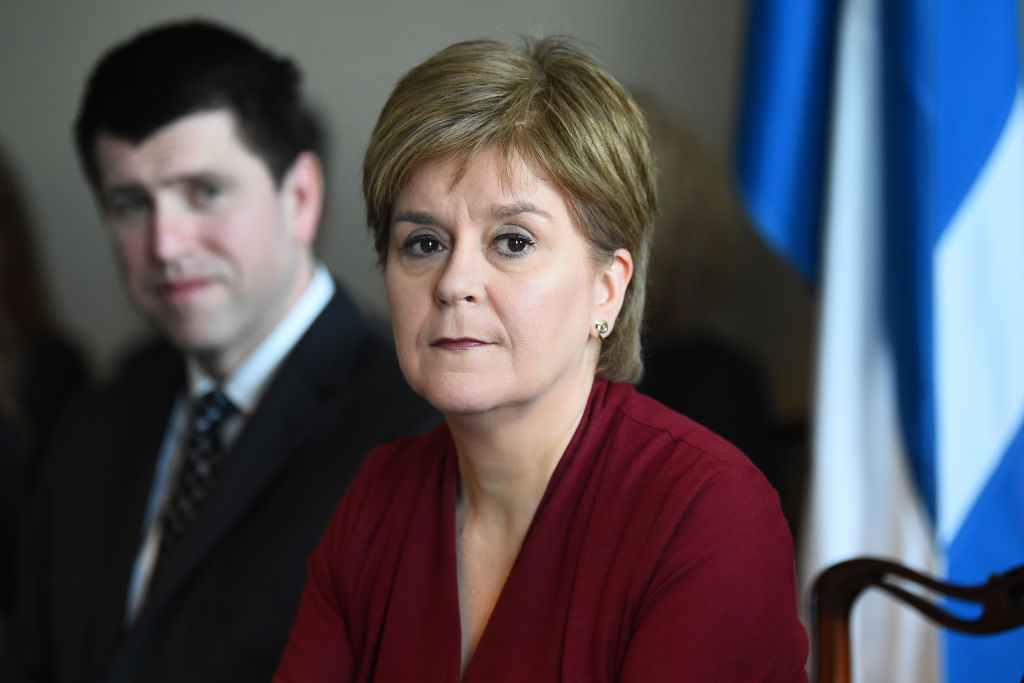Despite calls for Sturgeon to be suspended from the party, Humza Yousaf has said today that he will not do so, telling BBC Scotland that he sees ‘no reason’ to suspend a party member who has been released without charge.
Not all SNP politicians agree with him, though. Angus MacNeil, the MP for Na h-Eileanan an Iar, tweeted yesterday: ‘This soap opera has gone far enough, Nicola Sturgeon suspended others from the SNP for an awful lot less! Time for political distance until the investigation ends either way.’
Michelle Thomson, the SNP MSP who was suspended herself despite never being under police investigation, has called on Sturgeon to ensure her values are ‘consistent’ – and to resign the party whip after her arrest.
And Ash Regan, who ran as a candidate in the SNP leadership race, has said that Sturgeon should ‘voluntarily resigning her SNP membership until this is all cleared up’. In an interview for BBC Scotland’s Good Morning Scotland, Regan said that the arrests and subsequent releases of three key SNP figures have become ‘a distraction to the party and the work of government’ and that if Sturgeon doesn’t go voluntarily then Yousaf needs ‘to really think about taking decisive action’.
You have to hand it to Nicola Sturgeon. Her news management is still spot on. Releasing her ‘I am innocent’ statement last night assured that the front pages today all carried the ‘I’ word in their headlines about her arrest under Operation Branchform. She’s no fool.
Like the ‘worst nightmares’ statement she made on her return to parliament in April, after the arrest and subsequent release of her husband Peter Murrell, it contained just the right amount of emotion and assertion of probity. The subtext: ‘How could this be allowed to happen? People don’t call me “Saint Nicola” for nothing.’
Clearly she has not contemplated resigning from the party in order to remove the cloud of negative headlines hanging over the SNP government. The very idea! Yet this is precisely what she has expected of other SNP politicians who have become enmeshed in the law, like Thomson, the former SNP minister who had to go over property dealings which turned out to be perfectly legal. Then there was the former children’s minister, Mark McDonald. He was forced to resign in disgrace in 2017 over a couple of allegedly risque texts to a female colleague. He never recovered.
Nicola Sturgeon’s statement insisted on her right to the presumption of innocence, saying: ‘Innocence is not just a presumption I am entitled to in law. I know beyond doubt that I am in fact innocent of any wrongdoing.’ I don’t recall her and her coterie according to that presumption with much enthusiasm in the case of Alex Salmond. Salmond voluntarily resigned from the SNP to clear his name as early as 2018 after he was accused of misconduct by that internal inquisition set up by Leslie Evans, permanent secretary to Nicola Sturgeon at the time.
This was part of the Scottish government’s sexual harassment policy set up after the #MeToo campaign kicked off. The Court of Session subsequently ruled that this disciplinary process had been unlawful, that Salmond had been wrongly accused and that he was entitled to costs of £500,000 – to be paid by the taxpayers of Scotland. But he wasn’t welcomed back.
Now I am not suggesting any cross-over, link or comparison here between the facts of any of these cases and Nicola Sturgeon’s arrest under Operation Branchform. But putting aside the details of each case, there are ample precedents in the SNP for politicians in similar circumstances being required by their own party to resign.
And I am not saying that political parties are right to expect this – quite the reverse. I think it is against natural justice for politicians to have their careers destroyed because of unproven allegations of wrongdoing. This somehow became the norm after #MeToo, which was accompanied by a widespread and reckless suspension of the very presumption of innocence to which Nicola Sturgeon has appealed.
Nicola Sturgeon was influenced by #MeToo in the Holyrood inquiry after Salmond’s acquittal, saying in her opening statement that she had ‘refused to follow the age old pattern of allowing a powerful man to use his status and connections to get what he wants’. Remember that this was after Salmond had been acquitted. While Sturgeon told the inquiry that Salmond’s acquittal was ‘beyond question’, she went on to condemn her predecessor, saying that she knew from her own conversations with Salmond that ‘his behaviour was not always appropriate’.
‘[The SNP] do have a code of conduct,’ Regan said on BBC radio this morning, ‘that says members should refrain from conduct that is likely to cause damage or hinder the party’s aims.’ Let’s not forget that it was Ms Sturgeon, above all, who promoted these very values…






